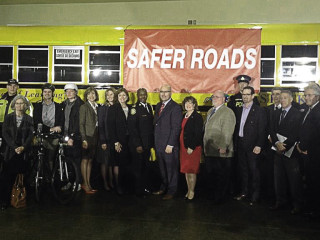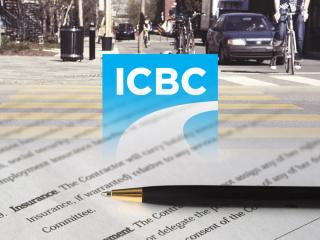Full Decision
This action arose from a serious back injury suffered by the Plaintiff, George MacPherson, on May 15, 2012, when he fell off the roof of the home of one of the Defendants, Sylvia Marie-Louise Samuel. Mr. MacPherson was hired by a second Defendant, David Paquette, who is now deceased, to assist in repairing the roof of Ms. Sylvia Marie-Louise Samuel. Ms. Samuel had hired Mr. Paquette to fix her roof. Mr. Paquette hired Ebrahim Khezri, the owner of Allan Star Roofing to attend on the second day of the job and the task at hand was challenging for him and Mr. MacPherson.
The fall and injury of George MacPherson occurred on the second day of the job, when he lost his balance as he was about to climb down the ladder from the roof. His harness was not tethered to anything at the time of the fall.
The defendants Samuel, Allan Star Roofing and Ebrahim Khezri moved for summary judgment and the dismissal of this action against them. They maintain that the plaintiff’s claims, if viable at all, lie only against the deceased, uninsured, defendant Paquette. The defendants sought from the court to exercise its enhanced fact-finding power under Rule 20.04(2.1) to resolve any factual disputes which they say would leave no genuine issue requiring a trial since Paquette, the deceased defendant, had been noted in default.
The defendants, Allan Star Roofing and Khezri (the “Allan Star Defendants”) also sought the dismissal of Ms. Samuel’s third-party action against them on the same grounds as they are seeking the dismissal of the plaintiff’s claims. Ms. Samuel agreed to a dismissal of the third-party action again the Allan Star Defendants only if the main action is dismissed against her.
Summary Judgement Framework
Rule 20.04 directs that the court shall grant summary judgment if:
a. the court is satisfied that there is no genuine issue requiring a trial with respect to a claim or a defence; or
b. the parties agree to have all, or part of the claim determined by a summary judgment and the court is satisfied that it is appropriate to grant summary judgment.
The leading case on summary judgement motions is Hryniak v. Mauldin, 2014 SCC 7, [2014] 1 S.C.R. 87. In Hryniak, the Supreme Court of Canada set two stages of analysis with respect to granting summary judgment motions:
- the judge should first determine if there is a genuine issue requiring a trial based only on the evidence before him or her without using the fact-finding powers in sub-rule 20.04(2.1).
- if there appears to be a genuine issue requiring a trial, Rule 20.04(2.1) permits the motion judge, at his or her discretion, to: (1) weigh the evidence, (2) evaluate the credibility of a deponent, or (3) draw any reasonable inference from the evidence unless it is in the “interest of justice” for these powers to be exercised only at trial: Hryniak, at para. 66.
Further, it was noted that the court is entitled to assume that each party in a summary judgment motion is putting their best foot forward with respect to the evidence presented and no better evidence would be led at trial.
With respect to the “interest of justice” in Hryniak at paras 58-60, the Supreme Court of Canada noted that the court should consider the consequences of the motion in the context of the litigation as a whole. Should the outcome of a summary judgement motion still lead to some of the parties to proceed to trial, the Supreme Court of Canada noted that “it may not be in the interest of justice to use the new fact-finding powers to grant summary judgement against a single defendant”. Courts should avoid granting summary judgement motions that would lead to inconsistent findings at trial.
Moreover, it was noted where there are material facts in dispute that rely upon the court making a determination on the credibility of a witness, it creates a genuine issue for trial, and thus granting a summary judgement motion is inappropriate in those cases. The filing of a jury notice by any of the parties, does not preclude the court from granting a summary judgement motion.
Summary Judgement Analysis
The court agreed with the plaintiffs’ arguments that there are genuine issues that require a trial. In particular, it noted that there are issues with Mr. MacPherson’s credibility with respect to the following questions:
a. Did Samuel agree to purchase and provide the missing safety equipment for the second day of the job, giving rise to a duty of care to MacPherson; and
b. Did Khezri, an experienced roofer, have knowledge that MacPherson was not safely secured to the roof (because he was on his way down to get a safety connector), and with that knowledge did he ask MacPherson to pass him a nail gun as MacPherson was about to descend down the ladder from the roof, giving rise to a duty of care based on the foreseeability of harm principle.
Justice Kimmel remarked that it is in the interest of justice that MacPherson’s credibility be properly assessed by the finder of fact at trial. Further, Justice Kimmel noted that partial summary judgement motions should be granted only in cases where the issues at hand can be easily bifurcated from those in the main action. Justice Kimmel did not think that a partial summary judgement motion would be appropriate in this case as the issues could not be bifurcated from the issues of the main action in an expeditiously and cost-effective manner.
Justice Kimmel further opined that the complete records of the evidence of each party will need to be presented at trial, including the 3 key witnesses, MacPherson, Samuel and Kherzi, and as such a partial summary judgement motion would risk creating duplication of proceedings and inconsistent findings of fact.
Lastly, Justice Kimmel noted that while the filing of a jury notice is not determinative on whether a summary judgement motion should be granted, rules do not allow for separate hearings on one or more issues in a proceeding that is decided by a jury, without consent. Once the jury is required to make a determination on some issues, without good reasons, the jury should be left to make all of the findings of fact for the issues in front of them.















